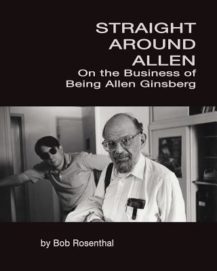 Bob Rosenthal
Bob Rosenthal
Beatdom Books ($28)
by Richard Kostelanetz
Though many books have been written about Allen Ginsberg since I profiled him for the New York Times Magazine in 1965, this one told me much that I’d not known before. Uniquely, it is written from the perspective of Ginsberg’s literary secretary, who ran the home office for two decades while his boss traveled and starred around the world.
Its subject is a celebrity who refused to live like a celebrity, which is to say that Ginsberg rented modest apartments in a marginal neighborhood while keeping the same P.O. Box for decades. He retained friends, some of whom became his de facto wards; continued to publish in eleemosynary magazines, even though an aggressive agent had connected him to the literary-industrial complex; and he instructed Bob Rosenthal to give reprint permissions for whatever publishers would pay, which could be nothing.
One recurring theme is Ginsberg’s generosity, indicatively allowing his fellow poet Gregory Corso, a drug-addicted beggar, to steal from Ginsberg’s library rare books that he would then purchase back from the bookseller who’d paid Corso. (John Cage was comparably generous; like Ginsberg he did not have children, and both correctly surmised that their estates would support at least one executor for decades later.)
Filled with modest detail, Straight Around Allen is an intimate portrait written from personal distance; Rosenthal, himself straight and married, notes that Ginsberg preferred manly men, often essentially heterosexual, in part because he simply ignored women (he often got wrong the first name of Rosenthal’s wife). His theme, implicit in the book’s subtitle, is of Ginsberg as a small businessman discharging many responsibilities while worried about income. Do not minimize this last achievement, which few prominent artists have realized as well. Consider also that Ginsberg overcame negative reviews to survive professionally for four decades while establishing a legend that continues for additional decades later.
Rosenthal writes dispassionately about his subject’s last days (here with a full text frequently quoted by others) and more about Ginsberg’s will and estate than most biographers do (though he refuses to mention dollar amounts). Those who consider Ginsberg devoid of calculation should read about his image of “Three Idiots.” One stylistic departure here, which I like, is that brief commentaries appear in smaller type adjacent to the principal text; these function like extended footnotes with asides and additional information. With images new to me—not only photographs but specimens of Ginsberg’s handwritten messages—and an informative text, this is a treasure. However, it does seem strange that Straight Around Allen should appear in 2019, more than two decades after its subject’s death, and that it should be published by a small publisher based in England.
